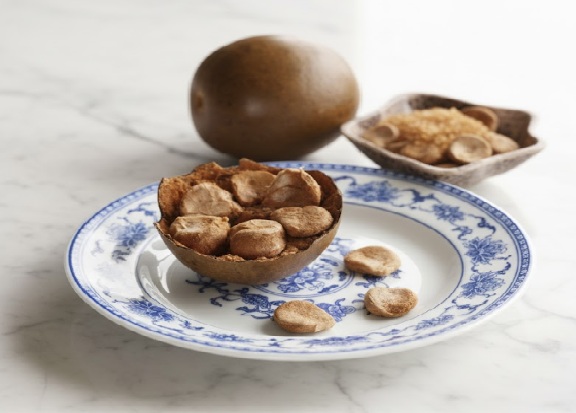Monk Fruit

Monk Fruit (Luo Han Guo): A Cooling Herb for Lung Health, Throat Relief, and Natural Sweetness
Introduction
Monk Fruit, known as Luo Han Guo (罗汉果) in Traditional Chinese Medicine (TCM), is the dried fruit of Siraitia grosvenorii, native to the mountains of Guangxi and Guangdong in southern China. Celebrated both as a natural sweetener and healing herb, Luo Han Guo has been used for centuries to moisten the lungs, relieve coughs, and cool internal heat. It is sweet and cool in nature, entering the Lung and Large Intestine meridians.
What Is Monk Fruit?
Luo Han Guo is a round, brownish-green fruit harvested from a perennial vine. The fruit is dried and used in teas or decoctions, prized for its intense natural sweetness that comes from mogrosides, plant compounds far sweeter than sugar but without calories. In TCM, Monk Fruit is used to clear heat from the lungs and intestines, ease sore throats, and reduce phlegm caused by dryness or inflammation.
Health Benefits of Monk Fruit
Clears Heat and Moistens the Lungs
Luo Han Guo helps relieve lung heat that causes sore throats, coughs, and hoarseness. It is particularly effective for dry coughs or those with little phlegm.
Soothes Throat and Voice
Its cooling and moistening properties make it a favorite remedy for singers, teachers, or anyone who strains their voice. A warm Monk Fruit tea provides quick relief from irritation.
Acts as a Natural, Low-Calorie Sweetener
The fruit’s mogrosides provide a clean, natural sweetness without raising blood sugar, making it ideal for diabetics or those avoiding refined sugars.
Supports Digestive Health
Monk Fruit helps to cool and clear the intestines, easing mild constipation or digestive discomfort caused by internal heat or dryness.
Provides Antioxidant and Anti-Inflammatory Support
Modern studies show that Luo Han Guo’s mogrosides possess antioxidant properties that help neutralize free radicals and reduce inflammation throughout the body.
How to Use Monk Fruit
In Herbal Preparations
Traditionally, dried Luo Han Guo is simmered in water to make a soothing tea. The fruit can be broken apart and boiled for 10–15 minutes. You can also find Monk Fruit in granules, powder, or syrup form.
In Daily Drinks and Recipes
Monk Fruit extract is a popular sugar substitute in drinks, desserts, and herbal teas. A small amount provides ample sweetness for soups, tonics, and beverages.
In TCM Formulas
Luo Han Guo is often included in formulas like Luo Han Guo Tang or combined with herbs such as Mai Dong and Chuan Bei Mu to relieve coughs and nourish yin.
Where to Buy Monk Fruit
You can find Luo Han Guo at:
- Chinese herbal shops and TCM pharmacies
- Asian grocery stores (dried whole fruit or tea sachets)
- Online retailers such as iHerb, Amazon, or ChineseHerbsDirect
Look for:
- Whole dried fruits that are light brown and slightly glossy
- Pure Monk Fruit sweeteners without added sugar or erythritol
- Reputable, lab-tested, or GMP-certified suppliers for safety and authenticity
Are There Any Side Effects?
Monk Fruit is generally safe and gentle for most people. However, excessive intake may cause mild digestive upset in sensitive individuals. Always choose pure Monk Fruit without chemical additives. Pregnant or breastfeeding women should consult a TCM practitioner before regular use.
Conclusion
Monk Fruit (Luo Han Guo) is a cooling, lung-moistening herb that combines healing tradition with modern wellness. Whether enjoyed as a tea or used as a natural sweetener, it helps clear heat, soothe the throat, and support respiratory and digestive health — a true harmony of flavor and medicine in TCM wisdom.
FAQs
Can I drink Monk Fruit tea every day?
Yes, in moderation. A daily cup is safe and helps cool and moisten the lungs naturally.
Does Monk Fruit help with sore throat or cough?
Yes. It’s one of the best TCM remedies for dry cough, sore throat, and hoarseness caused by heat or dryness.
Is Monk Fruit good for diabetics?
Yes. It’s naturally sweet but does not raise blood sugar, making it a healthy alternative to sugar for diabetics.

